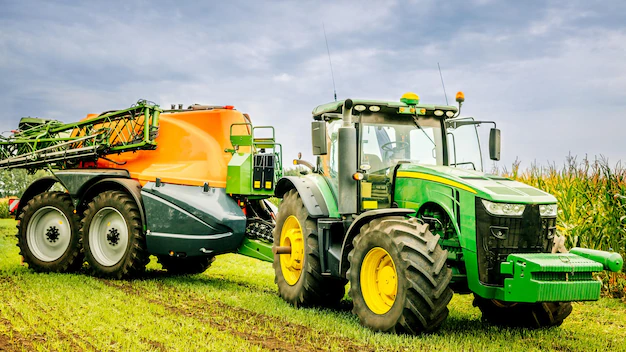Heavy machinery plays a vital role in modern farming, helping farmers complete tasks such as planting, harvesting, and transporting goods more efficiently. However, operating machinery like tractors, harvesters, and loaders can pose significant safety risks if not handled properly. Implementing safety measures is essential to protect operators, workers, and equipment. This article highlights best practices for operating heavy machinery on a farm safely.
1. Proper Training and Certification
Before operating any heavy machinery, ensure that all operators:
- Receive formal training on the specific equipment they will use.
- Understand the machinery’s functions, controls, and limitations.
- Obtain relevant certifications if required by local regulations.
Providing hands-on training and regular safety refreshers is essential for maintaining a culture of safety on the farm.
2. Conduct Pre-Operation Inspections
Before using any machinery, conduct a thorough inspection to identify potential issues. Check for:
- Fluid levels, including oil, hydraulic fluid, and coolant.
- Tire pressure, tracks, or wheels for signs of wear or damage.
- Loose or broken parts, such as belts, bolts, or hoses.
- Proper functioning of lights, brakes, and steering systems.
Address any issues before operating the equipment to prevent accidents or breakdowns.
3. Follow Manufacturer Guidelines
Every piece of machinery comes with a user manual detailing safe operation procedures. Follow these guidelines for:
- Weight limits and load capacities.
- Recommended speeds for different tasks or terrains.
- Maintenance schedules and servicing intervals.
Ignoring manufacturer recommendations can lead to equipment failure and safety hazards.
4. Wear Appropriate Safety Gear
Farm machinery operators should wear proper personal protective equipment (PPE), including:
- Steel-toed boots to protect feet from heavy objects.
- Gloves for better grip and hand protection.
- Protective eyewear to shield against dust and debris.
- Hearing protection, especially when operating loud machinery.
Bright or reflective clothing enhances visibility, especially in low-light conditions.
5. Maintain Clear Communication
Farms are busy environments with multiple workers and moving equipment. To avoid accidents:
- Use hand signals, radios, or other communication devices to coordinate activities.
- Establish clear protocols for signaling when machinery is in operation or moving.
- Ensure all workers are aware of blind spots and avoid walking near operating machinery.
6. Operate at Safe Speeds
Excessive speed is a leading cause of farm machinery accidents. Always operate equipment at a safe, controlled speed, especially when:
- Driving on uneven or sloped terrain.
- Navigating through narrow or crowded areas.
- Transporting heavy loads or attachments.
7. Be Aware of Surroundings
Operators should always be mindful of their environment to prevent accidents:
- Watch for obstacles like rocks, tree stumps, or uneven ground.
- Ensure children and animals are kept away from operating machinery.
- Stay clear of power lines and other overhead hazards, especially when using tall equipment.
8. Secure Attachments Properly
Farm machinery often uses attachments such as plows, trailers, or balers. Ensure all attachments are:
- Properly secured before operation.
- Compatible with the equipment’s capacity and specifications.
- Regularly inspected for wear and tear.
Loose or improperly attached equipment can lead to accidents and damage.
9. Avoid Fatigue While Operating
Fatigue significantly increases the risk of errors and accidents. To stay alert:
- Take regular breaks during long shifts.
- Stay hydrated and avoid working in extreme heat for extended periods.
- Ensure operators are well-rested before handling machinery.
Sharing workloads among multiple operators can help reduce fatigue.
10. Turn Off Machinery When Not in Use
Never leave machinery running unattended. When stepping away, even briefly:
- Turn off the engine.
- Engage the parking brake.
- Lower any raised attachments to the ground.
This simple habit prevents accidents caused by unintended movement or unauthorized use.
11. Keep Machinery Well-Maintained
Regular maintenance is critical for safe and efficient operation. Follow a maintenance routine that includes:
- Lubricating moving parts to prevent wear and tear.
- Replacing worn-out components promptly.
- Checking fuel and hydraulic systems for leaks.
- Keeping equipment clean and free of debris.
A well-maintained machine is less likely to malfunction and cause accidents.
12. Prepare for Emergencies
Accidents can still happen, despite all precautions. Be prepared by:
- Equipping the farm with first-aid kits and fire extinguishers.
- Training workers on emergency procedures, such as evacuations and injury response.
- Keeping emergency contact numbers readily available.
13. Adhere to Legal Requirements
Comply with local regulations regarding farm machinery operation. These may include:
- Licensing requirements for operators.
- Weight and speed restrictions for machinery on public roads.
- Safety inspections and certifications for equipment.
Compliance not only ensures safety but also protects against legal liabilities.
Operating heavy machinery on a farm safely requires a combination of proper training, regular maintenance, and strict adherence to safety protocols. By following these best practices, farmers can create a safer working environment, prevent costly accidents, and ensure the long-term efficiency of their equipment. Prioritizing safety is an investment in the well-being of both workers and the farm’s overall productivity.
Join 'Farmers Mag' WhatsApp Channel
Get the latest Farming news and tips delivered straight to your WhatsApp
CLICK HERE TO JOIN






